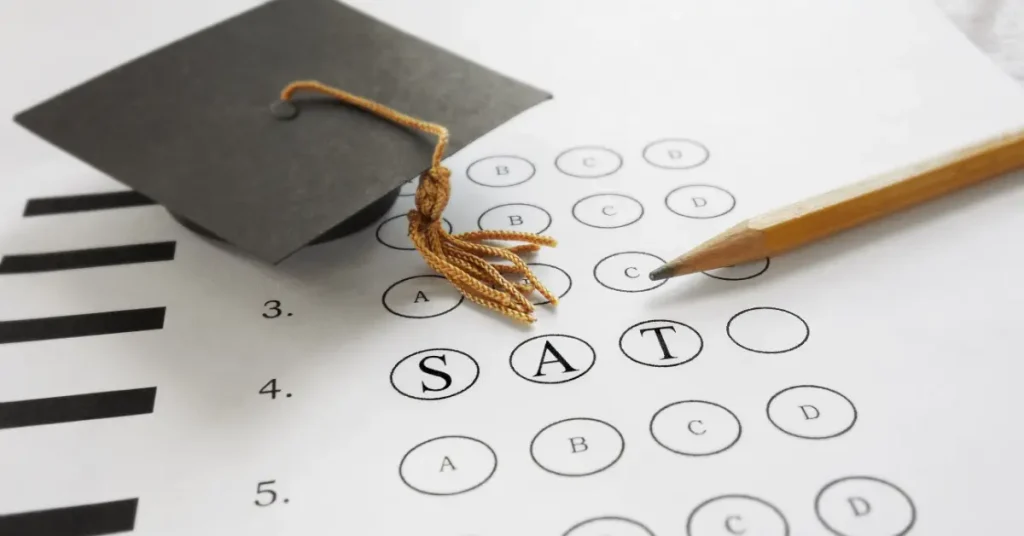If you’ve ever asked yourself, “Can you retake SAT®?”, the answer is yes, but whether you should depends on what you hope to gain from another attempt. Understanding the pros and cons of retaking the SAT helps you decide if a second try will truly raise your score or just repeat the same outcome.
Why Should You Retake the SAT?
Below are the most common reasons students retake the SAT and how to decide if a retake makes sense for your goals.
- To get close to your target score
If you had a target score and fell short, a retake can make sense, especially when your score is already near your goal. Many students see better results when they use the first attempt as a diagnostic, then study the second time.
A good way to confirm whether a retake is worth it is to look at your section performance and ask:
- Were you consistently missing one question type?
- Did pacing hurt you more than content gaps?
- Were careless errors a bigger issue than understanding?
If the answer is yes, you often do not need to “study more.” You need to study smarter by focusing on the specific skills that held you back on your last test.
- To reach the scores set by your desired schools
Some colleges have competitive score ranges, and even if the SAT is not the only factor in admissions, moving your score closer to a school’s typical range can help your application stand out.
Before you register for a retake SAT, compare your current performance to the schools you are applying to and confirm how those schools evaluate scores. Also, make sure you understand whether the school uses a single sitting or a combined score approach, since a strong SAT superscore strategy can sometimes make a retake more efficient if you only need to raise one section.
- To increase the chances of getting scholarships
Higher SAT scores can increase eligibility for some merit-based scholarships and financial aid programs, especially when awards are tied to score cutoffs. If you are close to a scholarship threshold, a retake can be one of the most time-effective ways to improve your outcomes, assuming you have enough time to prepare properly.
To plan the timing, check your intended deadlines first, then work backward using official SAT test dates and registration information so you do not miss score reporting windows.
- Digital SAT note
Because the digital SAT is adaptive, your performance early in a section influences the difficulty of later questions. That is why a targeted prep plan can be especially helpful for a SAT retake. When you focus on your weakest skills and practice with realistic timing, you are more likely to see section gains than if you simply retake the SAT without changing your approach.
Does Retaking the SAT Look Bad?
Retaking the SAT typically does not reflect negatively on students. A SAT retake is a standard way to improve a score, especially if you have a clear plan to raise one section or strengthen your overall results.
That said, what matters is how colleges will view and use your scores:
- Score Choice®: With score choice, you can choose which SAT test dates to send to colleges. This means you can submit only your strongest results. However, some colleges require all scores from every attempt, so it’s important to confirm each school’s policy before you decide how many times to retake the SAT.
- Superscoring: Many colleges use superscoring, which means they consider your highest section scores across multiple test dates to create your best overall score. If your target schools superscore, a retake can be especially strategic because you can focus on improving the section that is farthest from your goal.
A retake SAT strategy is strongest when each attempt is purposeful. If you take the test repeatedly without improving, it can signal poor planning, not poor ability. If you are worried about excessive attempts, use your score report to identify exactly what to fix before you register again.
How to Verify a College’s Testing Policy
- Find the Official Source: Go to the college’s admissions website and locate the "Standardized Testing" or "Application Requirements" page.
- Check the "Sending" Policy (What they want): Look for instructions on which scores to submit:
- Score Choice / Best Sitting: You are allowed to choose and send only your best specific test dates.
- All Scores: You are required to submit your entire testing history from every date you took the exam.
- Check the "Scoring" Policy (How they read it): Confirm if the college uses Superscoring. This means they will cherry-pick your highest section scores across multiple dates to create a new, higher total. If not, they likely look at the Highest Single Sitting.
When Can You Retake the SAT?
Most students take the SAT for the first time in the spring of junior year, then retake the SAT in the fall of senior year if they want to improve their scores. There is no set limit on how many times you can retake the SAT, but an SAT retake is most effective when you leave enough time between attempts to adjust your strategy and target weak areas rather than making excessive attempts. Retaking the SAT costs the same as a regular registration: $68, plus a $43 international fee if you test outside the United States, with possible additional charges for optional services or select test centers.
Digital SAT Retake Timing
When planning a digital SAT retake, your timeline should support real improvement, not just a quick repeat. For most students, the “sweet spot” is spacing attempts far enough apart to fix weaknesses, not so close that you repeat the same mistakes.
- Best spacing between attempts: Aim for about 6-10 weeks between a digital SAT attempt and your next SAT retake. Shorter gaps often lead to excessive attempts without meaningful score gains. Longer gaps can work too, as long as you maintain consistent practice.
- BluebookTM practice-test cadence: Start with one official practice test early to diagnose weaknesses, then take another full-length test every 2-3 weeks to track progress. In the final 10–14 days, complete one final timed run to confirm pacing and endurance before you retake the SAT.
- Device readiness & test-center availability: Treat logistics as part of your prep. Confirm your device setup well before test day, complete any required app steps, and plan ahead if local seats fill quickly. Test-center availability can affect where you can register and how soon you can schedule your SAT retake.
Retaking the SAT as an International Student
An SAT retake is absolutely possible for international students, but planning matters more because availability and fees can vary.
- Availability varies by country/city: Some locations have limited test centers or fewer open seats, so earlier registration is often necessary.
- International fees differ: In addition to the standard SAT registration fee, international testers typically pay an extra international fee, and certain test centers may also add local charges.
- Plan around US application deadlines: Because score release and score sending can take time, choose your retake date with a buffer so your scores arrive before college and scholarship deadlines.
- Superscoring and score choice still vary by university: International students should review each college’s policy so they know whether they can submit their best scores, superscore across test dates, or whether the school requires all attempts.
International students can retake the SAT as many times as they want, as long as test dates and seats are available. They can retake the SAT at participating international test centers, and the most reliable way to confirm locations in a specific country or city is to check available test centers during registration and choose a date that still leaves enough time to prepare and improve.
Are You Preparing to Retake the SAT? Here’s What to Consider!
If you are thinking of retaking the SAT, here are some pointers to help you out:
- Finalize your next testing date
You need to choose and lock in your next test date. This keeps your SAT retake plan realistic and helps you avoid procrastinating. Some students can prep intensively for about a month, while others do better with 2 to 3 months of steady study. A practical target for many students is around 8 to 12 weeks, especially if you are trying to build skills instead of just reviewing. Once you are done with your first attempt, use what you learned to map out what needs to change before you retake the SAT.
- Evaluate your score report
Once you have a date on the calendar, start by reviewing your score report in detail. Your first set of results is the fastest way to spot patterns, such as which question types you miss most often, where timing breaks down, and which skills need the most work. This helps you build a focused SAT study plan instead of starting over from scratch.
- Focus on sections and subscores
While it is important to study for the whole exam, most students improve faster when they focus on the sections and subscores that are costing them the most points. Instead of spreading your time evenly, put extra attention on your weakest areas and track whether accuracy and pacing are improving. Using targeted practice from a SAT Question Bank can help you drill the exact skills you need to improve.
- Practice before retaking the SAT
Do not rush into your next attempt. Give yourself enough time to practice under test-like conditions, including timed sets and full-length practice tests. This makes it easier to tell whether your score is improving because your skills are stronger, your pacing is better, or both. Building your routine around a realistic SAT Practice Test schedule can also help you feel more confident before test day.
If you decide that retaking the SAT is the best move, make sure your preparation matches your goal. Many students benefit from combining structured lessons with targeted practice, which is where a SAT Course and consistent review can make the second attempt worth your time.
Identify Retake Goals by Section
Before you commit to another SAT retake, set one clear goal per section so your prep time is focused and measurable. Start by prioritizing the section that is farthest from your target, then decide whether improving one section could be enough to raise your overall result through a superscore strategy. Finally, choose a realistic gain range based on how much time you have before the test day and how consistently you can practice.
Mini checklist to set your retake goals
-
Identify the section that needs the biggest improvement to meet your target.
-
Decide whether a superscore approach could help you reach your goal faster.
-
Set a realistic score-gain range based on your timeline and recent performance.
How to retake the SAT
Once you decide to test again, registration is straightforward and only takes a few minutes. Use the steps below to complete your SAT retake registration and set up a plan that leads to real improvement.
- Log in to your College Board® account.
- Choose a test date and test center based on availability and your prep timeline.
- Confirm your device is ready for digital testing before you finalize registration.
- Complete payment or apply a fee waiver if you qualify.
- Build a prep plan using your score report so you know what to fix before you retake the SAT.
Retaking the SAT: Frequently Asked Questions (FAQs)
How much does it cost to retake the SAT?
Retaking the SAT costs the same as taking it the first time. Each time you sit for the SAT, you pay the standard registration fee again. According to the College Board, the current registration fee for the digital SAT in the United States is $68 per test attempt, regardless of whether it is your first try or a retake. Students testing outside the United States pay the base registration fee plus an additional international regional fee, which varies by country. Some students may qualify for fee waivers that allow them to take the SAT for free and reduce certain extra charges. Keep in mind that late registration, test centre changes, or canceling and re-registering can add extra costs on top of the basic registration fee.
How many times can you retake the SAT?
There is no official limit on how many times you can take or retake the SAT. The College Board allows students to sit for the exam as many times as they choose. In practice, you are limited only by how many test dates are offered each year and what fits your schedule. The SAT is typically available on multiple national dates across the academic year, so you can plan 2 or more attempts if needed. Most students take the SAT 2 or 3 times at most, since scores tend to level off after a few attempts, and each retake costs additional time and money.
Can you retake one section of the SAT?
No. You cannot retake only one section of the SAT, even if you only want to improve Reading and Writing or Math. The SAT is administered as a complete exam, so every SAT retake includes all sections. If your goal is to raise just one area, the best strategy is to focus your prep on that weaker section while still maintaining your strengths. This can be especially useful if your target schools superscore, since improving one section can still raise your overall outcome. Using structured resources like SAT prep books can help you review weak skills efficiently before you retake the SAT.
Do colleges see how many times you take the SAT?
It depends on the college and what scores you send. Many colleges only see the SAT scores you submit, but some schools require applicants to send scores from every attempt. That is why it is important to check each college’s score policy before you plan multiple SAT retakes. If a school allows score choice or superscoring, retaking the SAT can be a strategic move since colleges may focus on your best results. If a school requires all scores, focus on purposeful preparation, so each attempt shows progress. When in doubt, confirm the policy directly on the college’s admissions site.
Can you retake the SAT after graduating high school?
Yes, you can retake the SAT after graduating high school. The SAT is not limited to current high school students, so you can register for a future test date as long as seats are available. Students often retake the SAT after graduation if they are reapplying, aiming for different schools, or trying to qualify for scholarships. If you are in a gap year, planning matters so your scores arrive in time for deadlines. Treat your SAT retake like a fresh attempt by using your prior score report to guide your prep. This helps ensure the next score reflects real improvement.
Can you retake the SAT in college?
Yes, you can retake the SAT in college if you need a score for a transfer application, special program requirement, or other academic goal. The SAT retake process is the same: you register for an available test date, take the full exam, and then choose how to send scores based on the college’s policy. Before you retake the SAT, confirm whether the school you are applying to actually requires SAT scores, since many colleges are test-optional. If you do submit scores, a higher result can strengthen your application depending on the program. Make sure your prep is targeted so the retake is worth the time and cost.
Can you retake the SAT as a senior?
Yes, many students retake the SAT as a senior, especially in the fall, to improve scores before college deadlines. The key is timing: plan your SAT retake so your scores are released and sent before your application and scholarship cutoffs. If you are applying Early Action or Early Decision, you may have fewer retake opportunities, so your prep needs to be focused. Seniors often benefit from working on the one section that is holding them back the most. If your school offers SAT School Day, it can be another option to consider when deciding when to retake the SAT. Avoid last-minute retakes that leave no time to study differently.
Can you retake your SAT after sending scores?
Yes, you can retake the SAT even after you have already sent scores to colleges. A new SAT retake does not replace your earlier scores automatically, but you can send updated results after your next test. Whether the college uses the highest score, superscore, or requires all scores depends on its policy. If you are aiming to improve your application, plan your retake so the new score reaches schools before their document deadlines. This is also why it helps to avoid excessive attempts and instead retake only when you are ready to improve. Use your prior results to build a prep plan that targets weak skills.
Can you retake the SAT when applying to test-optional colleges?
Yes. Test-optional policies mean you can choose whether to submit SAT scores, not that you cannot take the exam. If you believe a stronger score will improve your chances, retaking the SAT can be worthwhile even for test-optional schools. This is especially true if a higher score could support scholarship eligibility or strengthen an otherwise borderline application. Before planning a SAT retake, check whether your schools are test-optional, test-flexible, or test-required for your admission year. If you decide to submit, focus on a targeted prep plan so the retake produces a meaningful gain. If you decide not to submit, your time may be better spent elsewhere.
Can you use a fee waiver to retake the SAT?
In many cases, yes, eligible students can use a fee waiver to reduce the cost of taking the SAT, and it may cover more than one test date depending on the student’s eligibility and waiver rules. This can make a SAT retake more accessible if cost is the main barrier. The exact coverage can vary, so confirm your eligibility through your school counselor or official College Board guidance before you register. Even with a waiver, avoid excessive attempts and retake only when you have a solid prep plan in place. Use the waiver strategically after reviewing your score report and setting clear section goals. That approach gives you the best chance of improving on your next attempt.
References
- Should I Retake the SAT? Big Future. (2025). College Board. Retrieved from https://bigfuture.collegeboard.org/plan-for-college/apply-to-college/should-i-retake-sat
- International Fees. (2025). SAT Suite of Assessments. College Board. Retrieved from https://satsuite.collegeboard.org/sat/registration/international-testing/fees
- Score Choice: SAT Score-Reporting Policy. (2025). College Board. Retrieved from https://secure-media.collegeboard.org/digitalServices/pdf/professionals/sat-score-choice-score-reporting-policies-facts.pdf
- Full-Length Digital Practice Tests on Bluebook. (2025). SAT Suite of Assessments. College Board. Retrieved from https://satsuite.collegeboard.org/practice/practice-tests/bluebook
- SAT School Day. (2025). SAT Suite of Assessments. College Board. Retrieved from https://satsuite.collegeboard.org/sat-school-day
- SAT School Day Test Dates. (2025). SAT Suite of Assessments. College Board. Retrieved from https://satsuite.collegeboard.org/sat-school-day/test-dates
- Full-Length SAT Suite Practice Tests. (2025). SAT Suite of Assessments. College Board. Retrieved from https://satsuite.collegeboard.org/practice/practice-tests




